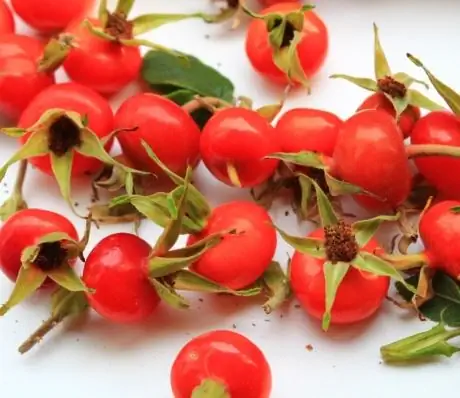- Author Rachel Wainwright [email protected].
- Public 2023-12-15 07:39.
- Last modified 2025-11-02 20:14.
Mandarin
The tangerine citrus, so beloved by us and our children, grows on a small, branchy evergreen tree of the Citrus genus, the Rutov family. Mandarin is native to China. The tangerine tree came to Europe at the beginning of the 19th century - and today this culture is one of the most common both in tropical Asia and in many other warm countries (France, Spain, Georgia, Azerbaijan, Morocco, Argentina). In Russia, mandarin is grown in the Caucasus, in the region of the Black Sea coast.
The ratio of BJU in the product

Source: depositphotos.com How to burn 53 kcal?
| Walking | 13 minutes |
| Jogging | 6 minutes |
| Swimming | 4 minutes |
| A bike | 8 minutes |
| Aerobics | 11 minutes |
| Household chores | 18 minutes |
Mandarin description
Mandarins grow on small bushes, not exceeding 4 meters, with dark green ovoid shoots. Fruits are small, about 5-6 cm in diameter, slightly flattened from top to base. The rind is thin and loose, bright orange in color. The pulp of tangerines, which, as a rule, tastes sweeter than orange, is divided into well-separated slices, only 10-12 pieces. Mandarins are distinguished by a pronounced citrus aroma.
The benefits of tangerines
Tangerine pulp is 90% water - the remaining 10% are sugars, pectins, acids, glycosides, mineral salts, vitamins, phytoncides and essential oils. It should be noted that tangerine does not contain nitrates, since the citric acid it contains serves as a natural "antidote" for them. Even with long-term storage and transportation, mandarin pulp is able to preserve all the substances necessary for human health.
The vitamin composition of citrus is worth mentioning separately. Mandarin is replete with ascorbic acid or vitamin C (content in 100 g of the fruit - 35 mg) - an element that is not independently produced by the body. Vitamin C is involved in all redox reactions, reduces vascular permeability, activates the body's defenses. In addition, ascorbic acid determines the powerful antioxidant properties of mandarins, helping to slow down the aging process of the body.
In addition, tangerines are rich in B vitamins, in particular, vitamins B1 and B2, provitamin A, P, K, D. In the complex, the benefits of tangerines are enormous: with regular use, citrus fruits saturate the body in the winter, protect children from rickets, help maintain the elasticity of blood vessels, are successfully used to treat diseases of the gastrointestinal tract, and also as a means to stop bleeding.
Mandarin is a valuable dietary product that increases appetite, improves metabolic processes in the body and cheers up. The properties of mandarins are impressive: citrus fruits have anti-scurvy, tonic, antimicrobial, anti-inflammatory, antifungal, antitussive effects on the body.
A decoction of tangerine peel is good for reducing blood sugar levels in diabetes. For its preparation, the peel of 3 citrus fruits is used, which was boiled in 1 liter of water for 10 minutes.
By the way, the properties of the tangerine peel are not limited to this action: in folk medicine, "cleaning" from tangerines is used as a stopping vomiting, reducing the symptoms of diarrhea, softening the cough in bronchitis and tracheitis of the drug.
Tangerine juice is able to cleanse the body of worms. As applications, both the fruits themselves and the freshly squeezed juice of tangerines are used as a remedy against "thrush" and fungal diseases of the skin (microsporia, ringworm, etc.).
Calorie tangerine
The calorie content of mandarin is 52 kcal per 100 g of its edible part. The nutritional value:
- Proteins - 0.8 g;
- Fat - 0.2 g;
- Carbohydrates - 7.5 g.
Mandarins are a valuable dietary product that is often used as the main ingredient in fasting days.
The use of tangerines
Tangerine fruits are very tasty fresh, however, they are often used in culinary production, for making juices, compotes, jams, sweets, and also alcoholic beverages. In the case of adding sugar to the product, the calorie content of tangerines increases, and citrus fruits lose their dietary properties.
Thanks to its bright and fresh aroma, citrus peels are used to make tangerine oil. The scope of application of tangerine oil is wide: in many countries it is used as a drug for the treatment of colic and flatulence in children (by gently massaging the tummy).

The role of tangerine oil in the beauty industry is also great: this product helps to nourish and moisturize the skin, and also well removes stretch marks (striae) in pregnant women. In aromatherapy, tangerine oil is used as a relaxing, anti-fatigue and stress reliever.
Contraindications
Despite the obvious benefits of mandarin, excessive consumption of this citrus is contraindicated for allergy sufferers, as well as for people suffering from diseases of the gastrointestinal tract: gastritis with high acidity, colitis, enteritis, gastric ulcer and duodenal ulcer. The citric acid contained in tangerines irritates not only the mucous membrane of the intestines and stomach, but also the kidneys - in this regard, the fruit is contraindicated in diseases such as hepatitis, cholecystitis and acute nephritis.
YouTube video related to the article:
Found a mistake in the text? Select it and press Ctrl + Enter.






